Unit 36: Enhancing Social Skills through Early Intervention in Autism
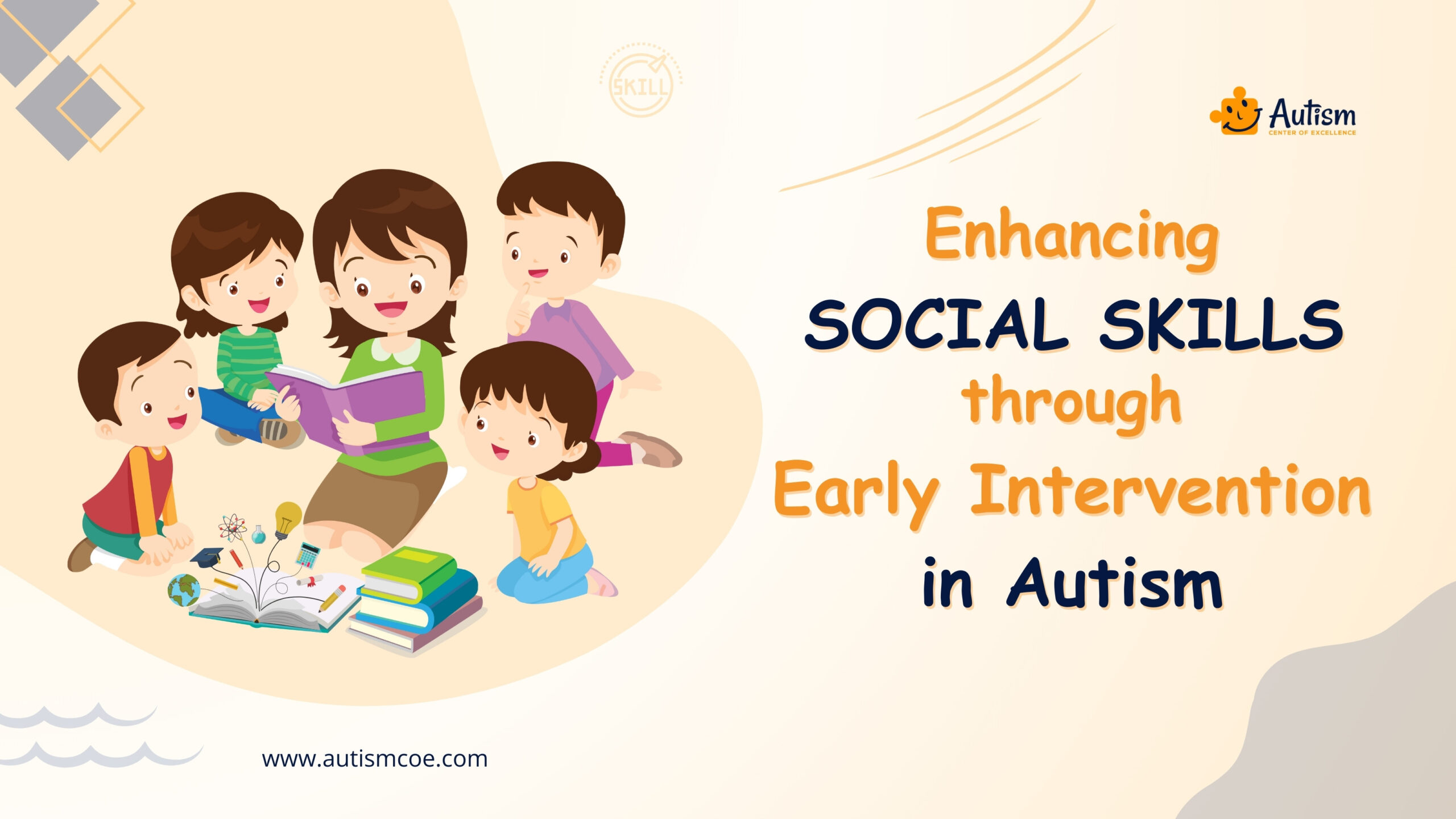
Developing social skills is a critical aspect of a child’s overall growth, but for children with Autism Spectrum Disorder (ASD), mastering these skills can be uniquely challenging. Social skills refer to the ability to interact effectively with others, including understanding and responding to social cues, maintaining conversations, and forming meaningful relationships. Children with autism often face difficulties in these areas due to differences in communication and social understanding, which can affect their social development.
The encouraging news? The power to change this narrative is early intervention. Parents, educators, and therapists address early social Skills Development to give a child a better start in engaging with the world. In this blog post, you’ll learn about how Early Intervention Programs can help, along with ABA strategies and practical tips on improving social skills in children with autism.
The Impact of Early Intervention on Autism and Social Development
Early Intervention is a proactive approach that focuses on supporting children during their formative years—and for children with autism, these early years are a critical window for development. Research highlights that the brain is most adaptable during childhood, making interventions especially effective in shaping social and Communication Skills.
Starting treatment early allows children to learn tools and strategies to interact with others as they gain the ability to recognize facial expressions, respond to greetings, or join in cooperative play. As they age, these foundational skills help them transition more easily into academic settings and community spaces. Early intervention also boosts a child’s confidence and prevents them from dealing with potential frustrations through social challenges.
Some of the benefits of early intervention for social skills include:
- Improved communication and interaction with peers and adults.
- Improved social norms and cues understanding.
- Development of Emotional regulation and cooperative play.
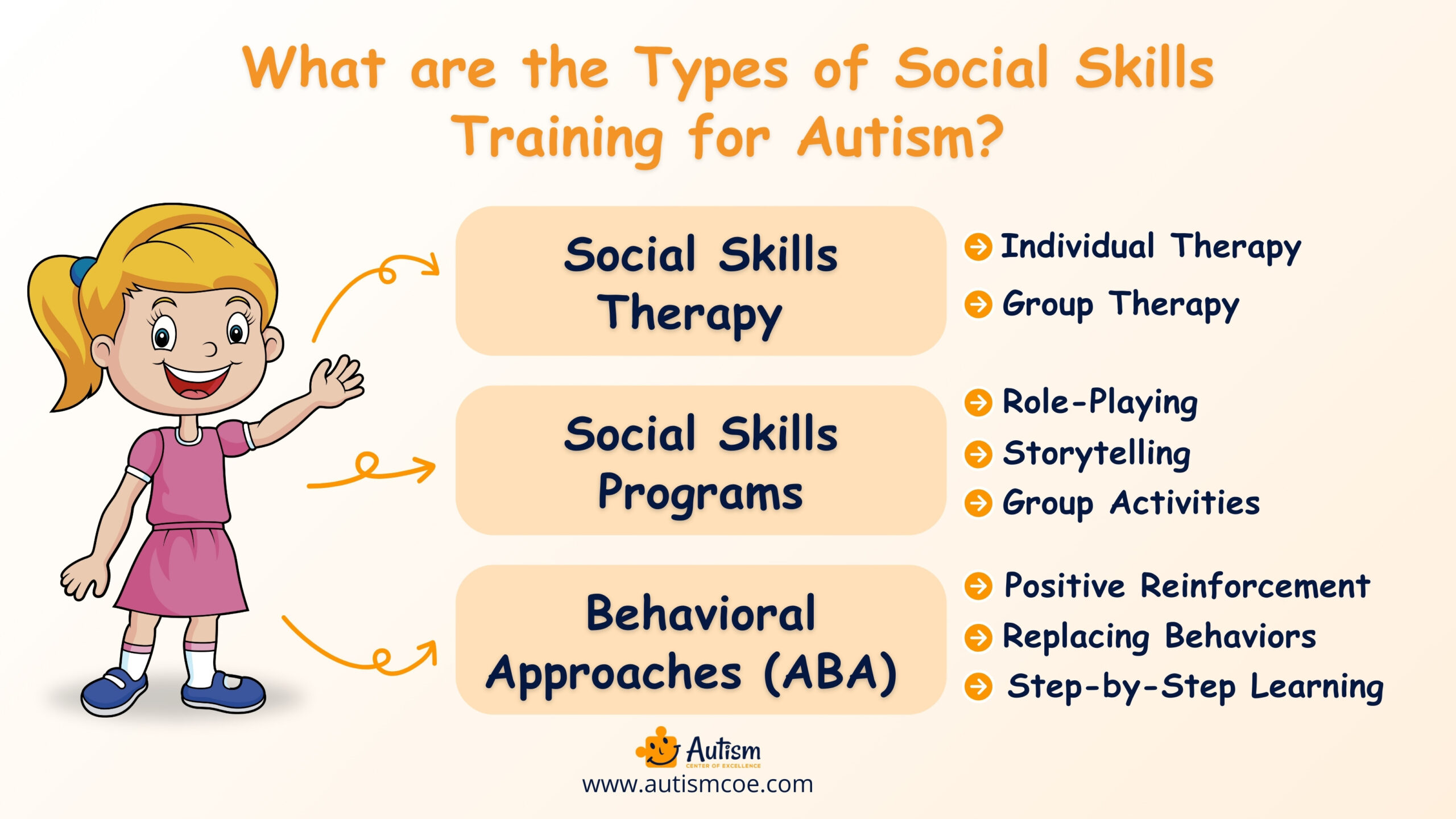
Types of Social Skills Training for Autism
Social skills training in an autistic child must fit the child’s unique needs, desires, and goals. Below, we will dive deeper into different methods that help children develop essential social skills
1️⃣ Social Skills Therapy
Social skills therapy builds the skills needed to enhance interaction and relationships. It can be delivered in two key formats:
Individual Therapy
Therapists meet with children in this one-on-one setting to address specific social challenges. The focus may be to help the child improve their eye contact, teach them how to take turns in a conversation and help them recognize social cues, such as facial expressions and tone of voice. Individual therapy provides a personalized setting in which your child isn’t on deadline, doesn’t need to keep up with other children, and can move forward at their own pace.
Group Therapy
Group sessions are conducted in a guided environment where children practice social skills with children about their age right before them. Children learn teamwork, collaboration, and Conflict Resolution through role-playing, cooperative games, and group discussions. This setting enables us to replicate real-world social interactions, allowing children to apply these skills outside of therapy confidently.
2️⃣ Social Skills Programs in Educational Settings
Increasingly, structured programs to teach social skills to children with autism are offered at many schools. These programs often integrate creative, fun activities such as role-playing, storytelling, and interactive games. For example:
Role-Playing
Children act out different social scenarios, like asking to join a game or discussing a disagreement with a friend. Rehearsing and understanding appropriate responses in all sorts of situations helps them.
Storytelling
One way stories are used is to teach empathy and perspective-taking to work through social situations. Children will be able to learn social norms from other children or other people by having teachers guide them in discussing characters’ feelings and actions.
Group Assignments or Cooperative Games
Collaborative activities teach children responsibility, communication, and working together towards a goal. Particularly helpful in developing the skills for teamwork and handling conflicts in the group setting, these programs work best.
3️⃣ Behavioral Approaches (ABA Therapy)
ABA Therapy is a highly structured approach to improving social skills through underlying behavioral challenges. Positive reinforcement teaches children specific behaviors and responses that they will need to have better social interactions. For example:
Identifying and Rewarding Positive Behaviors
Therapists may reinforce behaviors the child already demonstrates, such as greeting or maintaining an appropriate amount of personal space, or a behavior such as responding to questions during a conversation, until they come naturally.
Replacing Problematic Behaviors
Instead, ABA Understands how to help children replace disruptive behaviors, such as interrupting or avoiding eye contact, with more appropriate choices, such as paying attention or letting someone else have their turn.
Breaking Down Complex Skills
Breaking social skills down into smaller, more manageable steps is the approach most often used by ABA. For example, while learning how to make a friend, teaching a child to say hello, initiate a conversation, and do a shared activity could be the process.
Through these two approaches, therapists, parents, and educators are able together develop a thorough plan that assists kids with autism to control social encounters all the more comprehensively. Each method is customizable to meet the particular challenges and goals of a child and give him or her the support required to thrive in social environments.
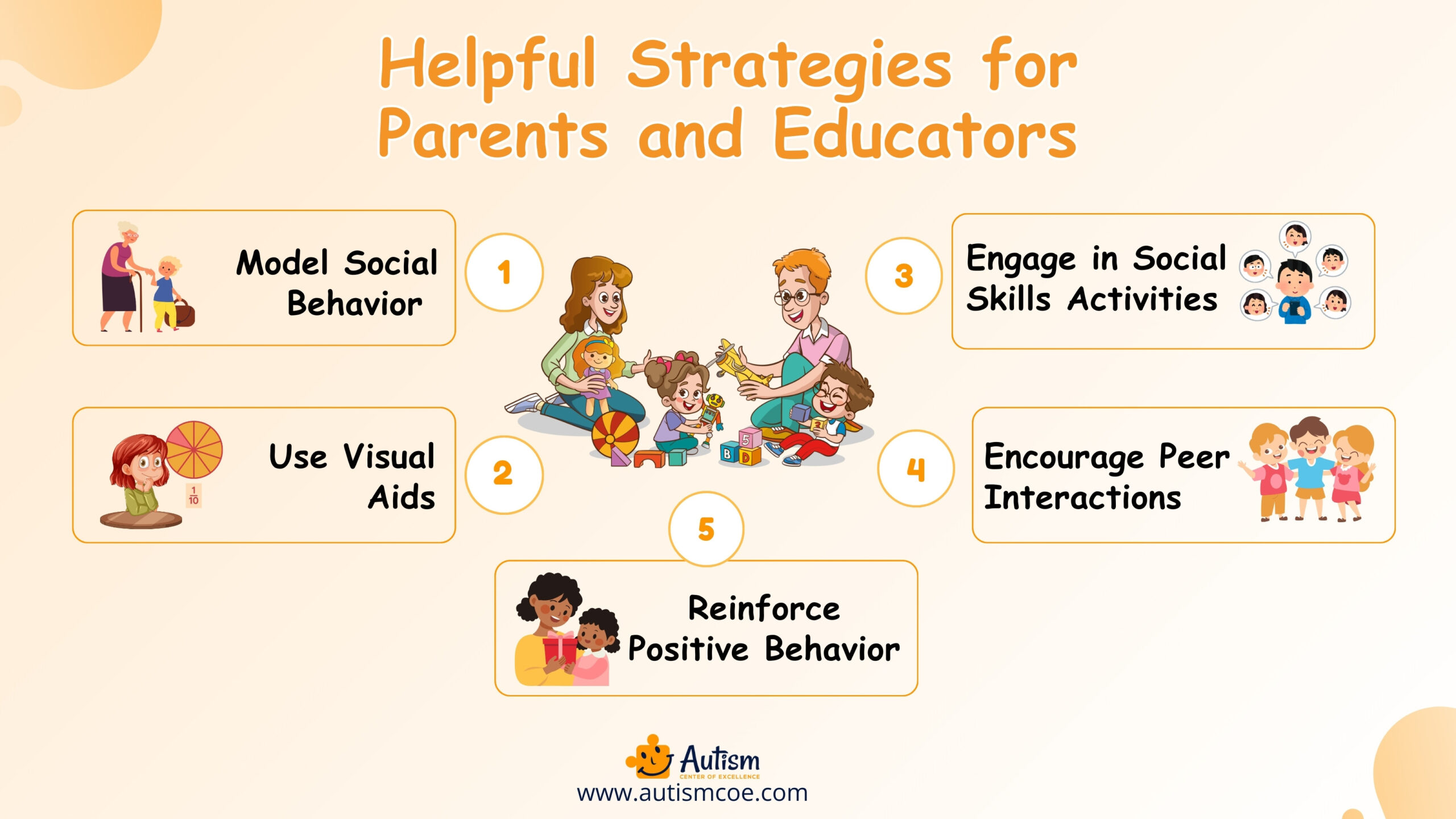
Practical Tips for Parents and Educators
Teaching social skills to a child on the autism spectrum is not a straight-line path peppered along the way with straight-edged starbursts of success; it involves patience, consistency, and creativity. Integrating social development opportunities as a natural part of routines, parents and educators can make having these skills learned more natural and effective. Here are some practical strategies to help children build essential social abilities:
👩💻Model Social Behavior
Children learn by observing adults. Demonstrate social behaviors like politeness towards you, making eye contact, knowing how to take turns in a conversation, etc. For example, give real-life examples like interacting model-friendly when you interact with the cashiers or thank someone for their help.
🤳Use Visual Aids
Charts and storyboards can break down complex social interactions into smaller steps. For example, you create a storyboard of how to greet another person, or you create a chart of conversation sequences like listen, respond, and question.
🤹Engage in Social Skills Activities for Autism
Social skills can be fun to learn using interactive games. The games “Emotion Charades” help kids recognize emotions while taking board games like “Candy Land” or “Chutes and Ladders” teach patience, cooperation, and understanding of social rules.
👥Encourage Peer Interactions
Promote social practice acting through peer interactions. Get children to practice skills such as sharing and building friendships, and arrange play dates, group activities, or inclusive settings where they can do so. Begin with small groups, which can be built upon as confidence grows to work with more complex things.
👪Reinforce Positive Behavior
Celebrate successes, big or small, with praise or rewards. For example, if a child greets a peer or takes turns in a game, acknowledge it by saying, “Great job! That was so kind.” Positive Reinforcement builds confidence and encourages continued practice.
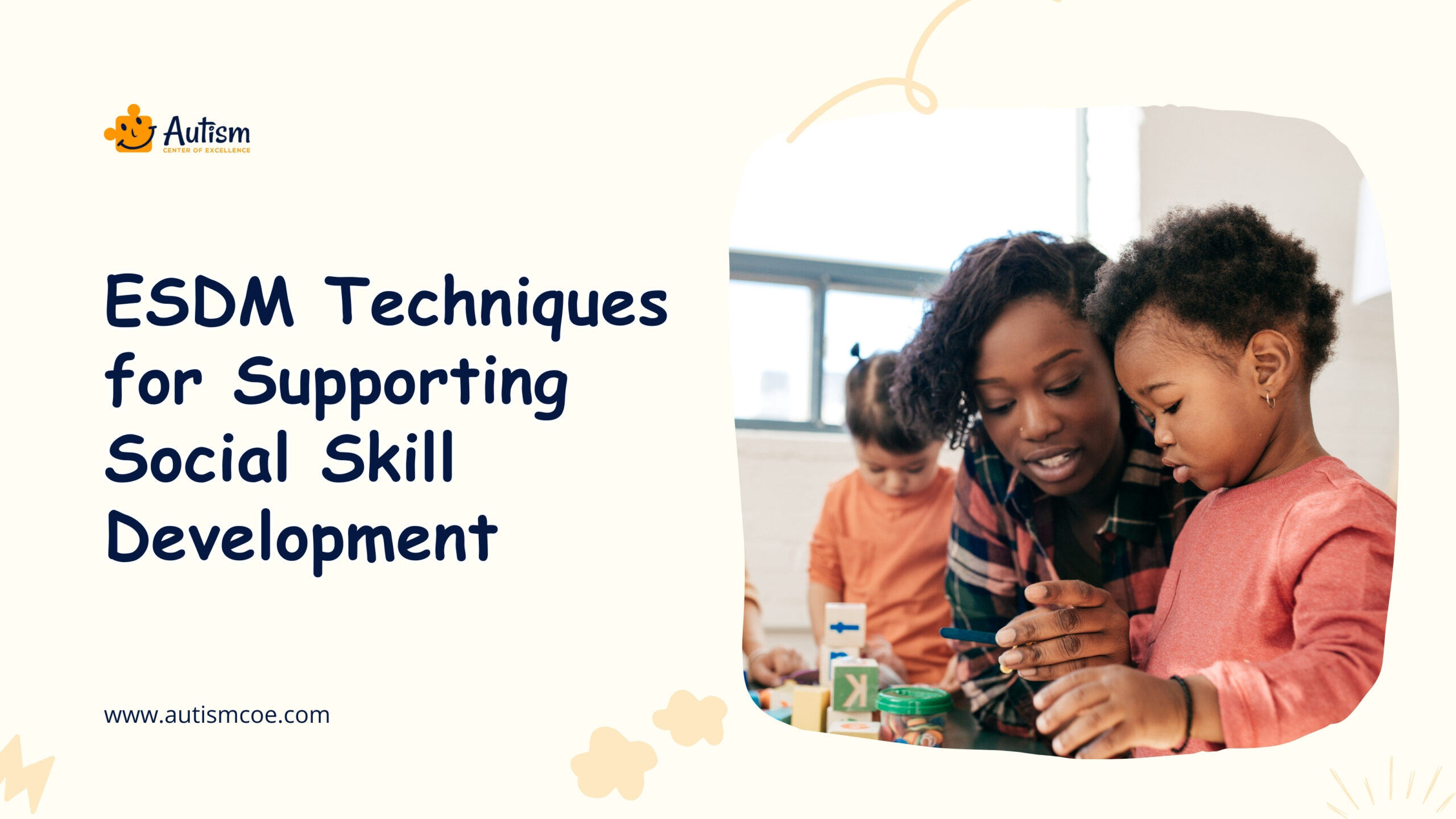
ESDM Techniques for Supporting Social Skill Development
The Early Start Denver Model (ESDM) is another powerful intervention framework for young children with ASD. Centered around play-based activities, ESDM centers play-based activities around shared interactions between children and caregivers. Active participation with parents in joint attention and imitation strategies and reciprocal social interaction strategies will enable parents to deepen family bonding and aid children in learning proper social adaptation in the real world.
Add ESDM techniques, and you now have methods for creating natural and playful learning environments where children begin the groundwork for their social skills. For instance, – toys or games that promote turn-taking or Storytime where she is allowed to practice shared focus.
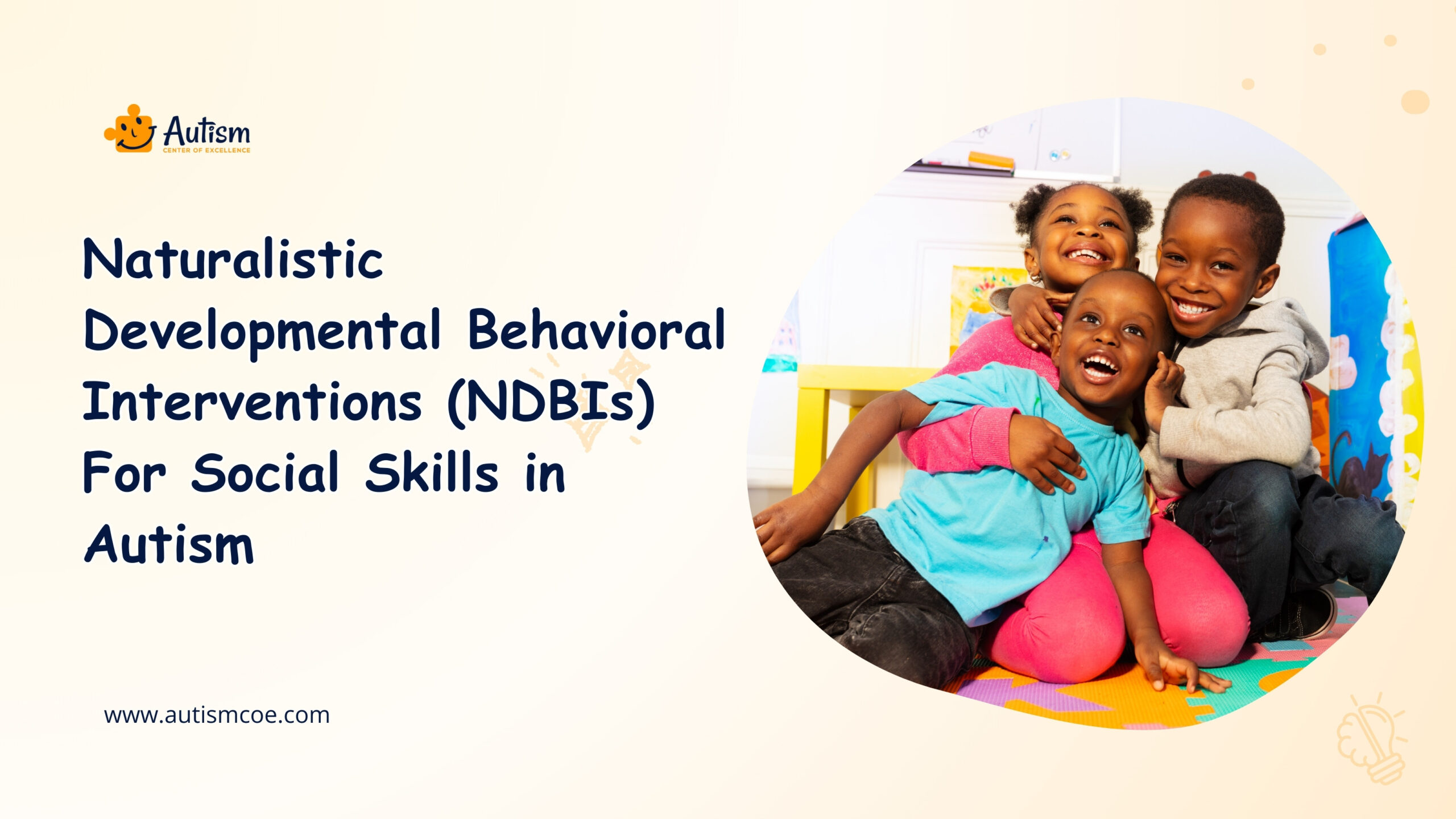
Naturalistic Developmental Behavioral Interventions (NDBIs) For Social Skills in Autism
Naturalistic developmental behavioral interventions (NDBIs) are child-centered and occur in a natural learning environment to capitalize on social skill development. NDBIs try to make people feel more motivated and involved in social exchange through meaningful activities and positive reinforcement.
Some common NDBIs for children with autism include:
- Early Start Denver Model (ESDM)
- Pivotal Response Treatment (PRT)
- Parent-mediated Intervention
NDBIs can be used just about anywhere: at home, at school, or even in therapy sessions with a trained professional. They usually require parent participation to generalize skills outside of structured therapy situations.
Enjoying Reading?
Join Our Weekly Newsletters!
Subscribe now to stay updated with our latest email updates.
Frequently Asked Questions & Answer
What Age Do Social Skills Develop?
Social skills begin developing in infancy, with milestones like eye contact and smiling. More complex skills, like turn-taking and empathy, emerge in early childhood.
What Causes Underdeveloped Social Skills?
Underdeveloped social skills can result from autism, ADHD, social anxiety, speech delays, or a lack of social exposure.
How Does ABA Teach Social Skills?
ABA uses modeling, reinforcement, role-playing, and structured social interactions to teach communication, cooperation, and emotional understanding.
What are the Social Skills Goals for Autism?
Goals include improving eye contact, turn-taking, conversation skills, emotional regulation, and understanding social cues.
Conclusion
Every child needs to be able to connect with others, but for children with autism, addressing social obstacles early on can help them become social strengths. With targeted therapies, structured social skill programs, and the persistent efforts of parents, educators, and therapists, children can learn to be masters of their little worlds and confidently relate to the world around them.
But know that autism’s path to social development isn’t one size fits all. Professional guidance and programs suited to their needs may make or break the problem-solving efforts. Whether it’s ABA or ESDM therapy, it’s social skills for Autism; no matter what, the right system can be set up to help empower these children to be able to succeed in school, at home, and all around.
If you’re ready to delve into some teaching strategies for social skills or just want to give your kid the best tools possible, find a certified therapist or a social skills program today.
Please Note: The content of this blog is for informational purposes only and should not be considered a substitute for professional medical advice, diagnosis, or treatment. Consult a qualified healthcare professional for personalized guidance tailored to your specific situation.

Bhavika Bhasin
Bhavika Bhasin is the Research and Marketing officer at AutismCOE. She works with children and adults with ASD. Her clinical research includes evaluating various available autism screening and diagnosis methods and their efficacy. She is currently developing a novel screening exam that is indicated to be more accurate than the existing available exams. She is also writes articles papers for various publications.

